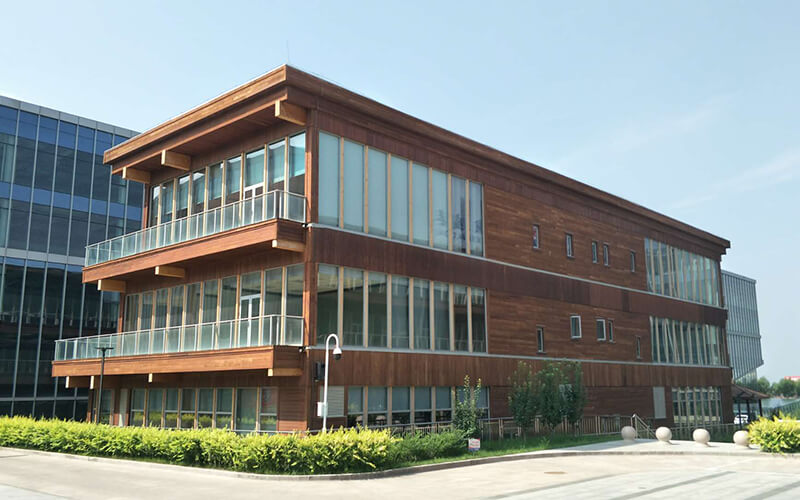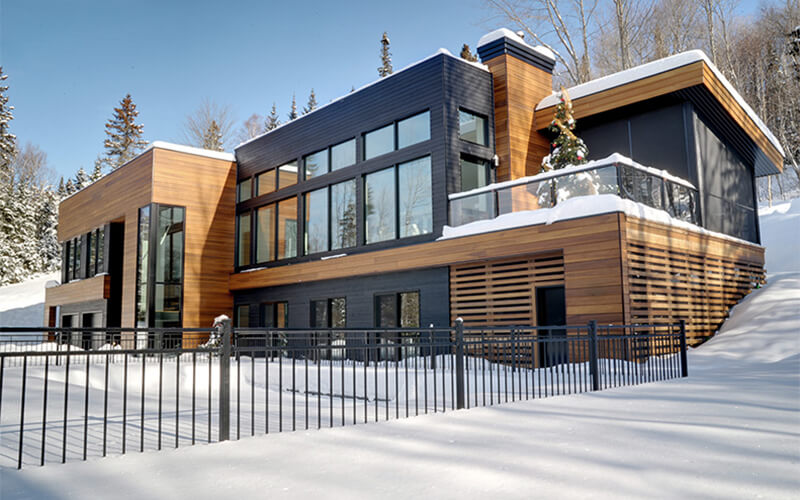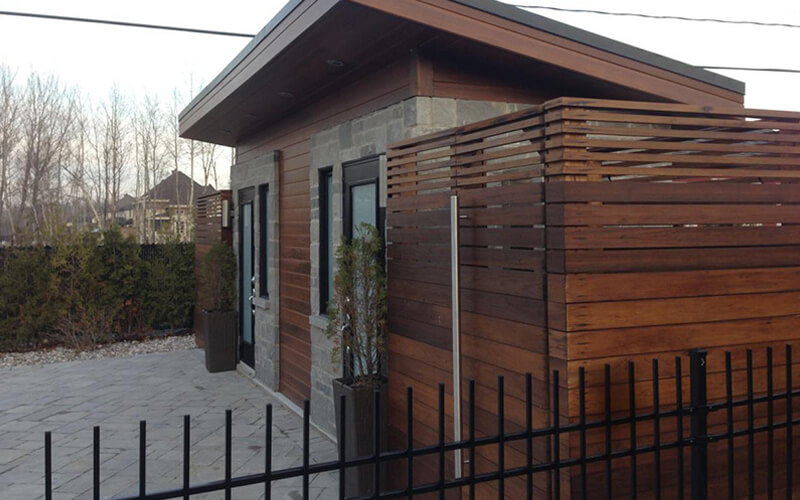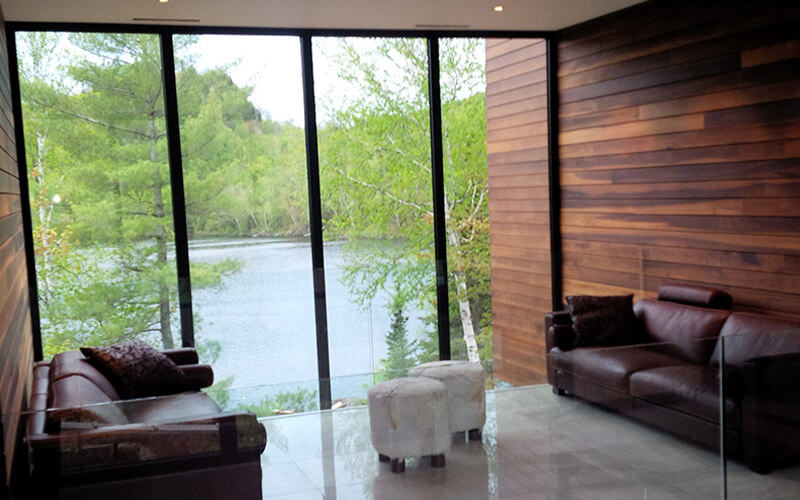Thermal modification is a chemical-free controlled process using high heat to alter the wood’s cell structure.
Thermal modification requires no chemical treatment and improves dimensional stability of wood substantially, creating a unique hardwood lumber that can be used in a variety of applications. Thermally modified lumber has the added benefit of a beautiful brown hue while still showcasing wood’s natural grain.
The Process
Modern thermal modification is carried out by gradually heating wood up to the temperatures of 160 and 246 Degrees Celsius in special heat chambers made of stainless steel under anoxic conditions. The heat removes organic compounds from the wood cells, changing both the physical and chemical make-up of the wood.
Treatment requires no additional usage of chemicals thus producing an ecologically friendly alternative to chemically treated wood.
4
The Advantages
Naturally Chemical Free
No added chemicals are used in thermally modifying ThermalE hardwood lumber, making it ecologically friendly. Thermally modified lumber is durable, and verified to be resistant to mold and fungus in independent studies, making it usable for exterior application. ThermalE can be used as a replacement for some chemically treated products.
Ecologically Friendly & Sustainable
ThermalE respects the highest green environmental standards. It can be transported, handled and machined safely, with no negative environmental impacts. With our commitment to responsible sourcing and sustainable forest management, ThermalE is a sustainable green wood product.
Aesthetically Pleasing
Thermal modification-treatment results in rich brown hues, varying from amber brown to a dark brown, depending on the wood species being thermally modified. ThermalE lumber is comparable in coloring to exotic woods, while ensuring the use of domestic North American Species.
Naturally Resistant and Durable
The thermal modification process removes naturally occurring sugars for insects and pests, resulting in lumber that is naturally decay resistant.
Greater Dimension Stability
Natural movement compared to traditional kiln dried hardwoods is up to 50% less with ThermalE the molecular structure of the wood which gives it greater dimensional stability. Thermo wood develops a greater resistance to warping, swelling or shrinking regardless of variations in temperature and humidity.
The Products
ThermalE is available in thermally modified poplar, thermally modified hard maple, thermally modified Red Oak and thermally modified ash.
Available thicknesses
4/4, 5/4, 6/4, 8/4
ThermalE is typically shipped rough sawn but can be ordered surfaced, straight-line ripped, or pulled to width. Please talk to your salesperson about your specifications.
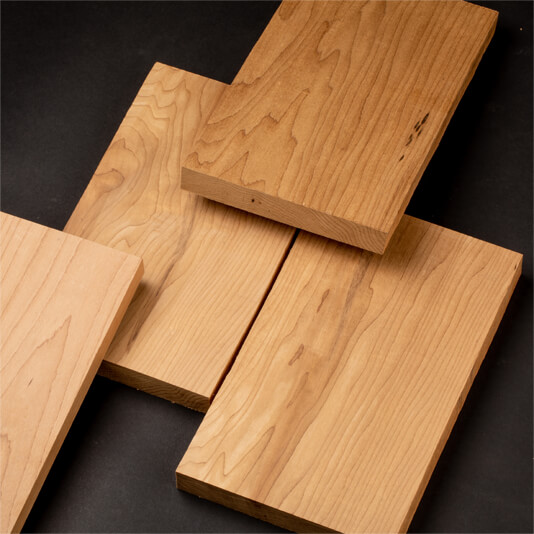
FAQ
Thermal modification is carried out by gradually heating wood up to the temperatures of 160 and up to 246 Degrees Celsius in special heat chambers made of stainless steel under anoxic conditions. The heat removes organic compounds from the wood cells, changing both the physical and chemical make-up of the wood.
The process requires no chemicals, producing an ecologically friendly alternative to chemically treated wood.
No. Thermally modified lumber was first created by the Vikings. Thermally modified lumber has been widely used in parts of Europe, the UK, and Japan for over 25 years. Thermally modified wood products have gained momentum in North America over the past few years, with much more growth to come.
Thermally modified lumber is always chemical free.
No chemical additives are used. Thermal modification requires only heat and steam to create an ecologically sound and chemical free wood with enhanced performance. Thermally modified lumber is ecologically friendly, resistant to mold and fungus, and durable, making it a viable replacement for chemically treated wood products.
As with all wood when placed in exterior applications, thermally modified wood will naturally age to a silver-grey color over time. The color of the wood does not indicate decay but is a natural process because thermally modified wood is not naturally resistant to UV light. The greying process will start immediately and can take several months or up to a year, depending on UV exposure. This does not affect the resistance to mildew and rot.
Maintaining the rich brown patina naturally provided by thermally modified wood just takes a little finish. Penetrating oils work best on thermally modified wood, since the nature of the wood will not let it absorb a water-based finish. Apply a regular UV oil or pigmented UV oil to the wood every 3 years (with shorter durations where wood is in direct sunlight for most of the day).
Sustainability of ThermalE
ThermalE modified wood – a sustainable alternative to tropical hardwoods
Tropical hardwoods can be a challenging choice when you are trying to choose wood products that are both durable and sustainable. ThermalE by DV Hardwoods gives you a new choice that has the beautiful wood grain and durability of tropical hardwoods but is a sustainable product and excellent green building material.
Tropical hardwoods are a desirable material for residential and commercial projects in both interior and exterior applications. Tropical hardwoods are durable, hard, and decay resistant. They appear to be the ideal material, yet the impacts of using even some certified hardwoods can be substantial, leading to threatening some of the most critical ecosystems on earth.
Until now, readily available substitutes for tropical hardwoods were usually lacking in performance and durability. Why use lumber from a tropical rainforest if there is another choice? We argue, a better choice.
The main environmental advantage of thermally modified lumber is it can be used for applications that require high durability like Ipe and other imported hardwoods but can be manufactured in North America using North American wood species.
Once hardwoods have been thermally modified, they rival imported tropical hardwoods for strength, durability, and stability.
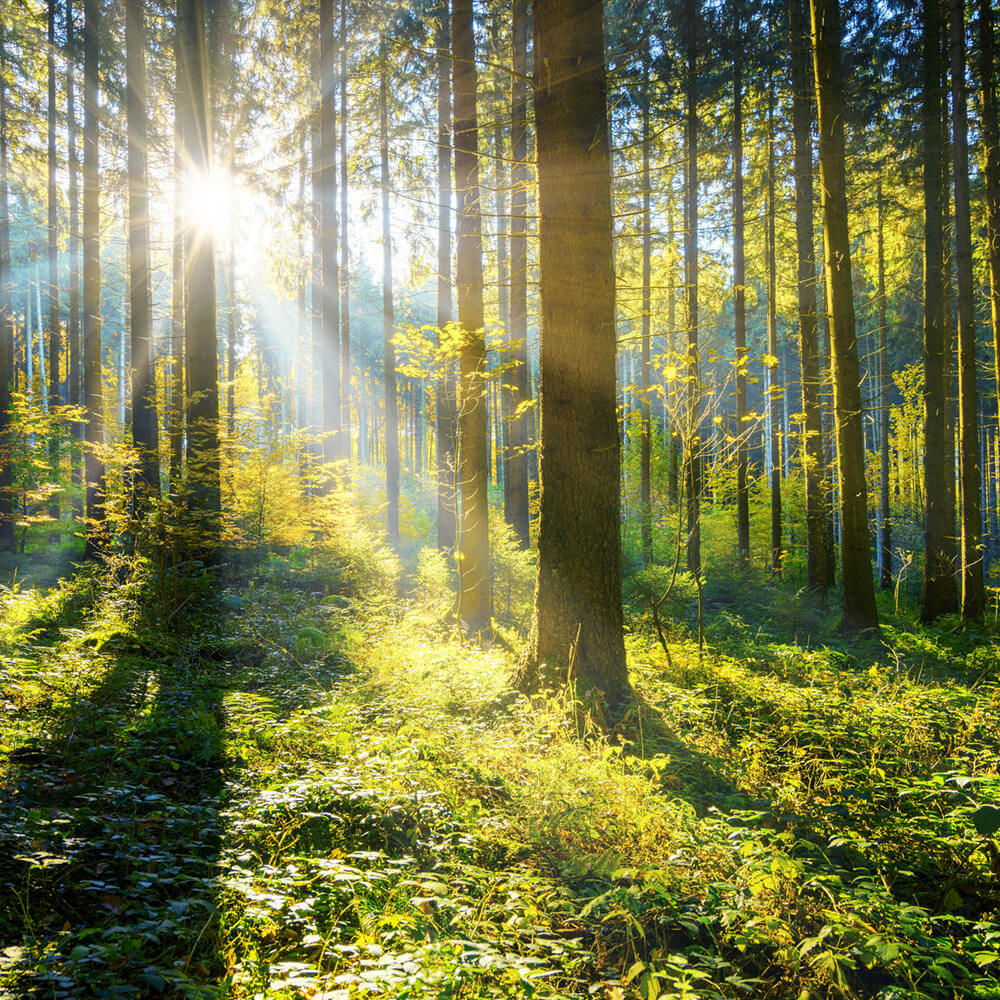
The Keys to Sustainability of ThermalE
Responsible sourcing of North American hardwoods.
All of the hardwood lumber used to make ThermalE incorporates responsible and sustainable stewardship practices.
DV Hardwoods is Committed to Sustainable Forest Management.
When our customers buy lumber from DV Hardwoods they can take comfort in knowing our policies are designed to protect the forest for generations to come. Whether our own production or lumber purchased from our partner mills, we only choose lumber sourced from sustainably managed forests.
Thermal-E is produced by a certified member of the Quebec Forest Industry Council (QFIC)which ensures that quality adheres QFIC strict guidelines to assure the customer of consistency in physical properties.
Canada & United States Commitment to Sustainable Forestry Practices Confirmed.
There is less than a 1% risk of any illegal wood entering the hardwood supply chain from the United States. This is based on independent peer-reviewed data from the 2008 “Assessment of Lawful Harvesting & Sustainability of U.S. Hardwood Exports” study commissioned by the American Hardwood Export Council. This study was reviewed and reaffirmed in 2018. United States hardwoods are legal and sustainable in line with all relevant international standards.
Canadian forests are mostly publicly owned and managed based on scientific research and rigorous planning. Canada’s strong system of forest laws, monitoring, and enforcement ensure sustainable forest management across Canada. Click here for more information.


